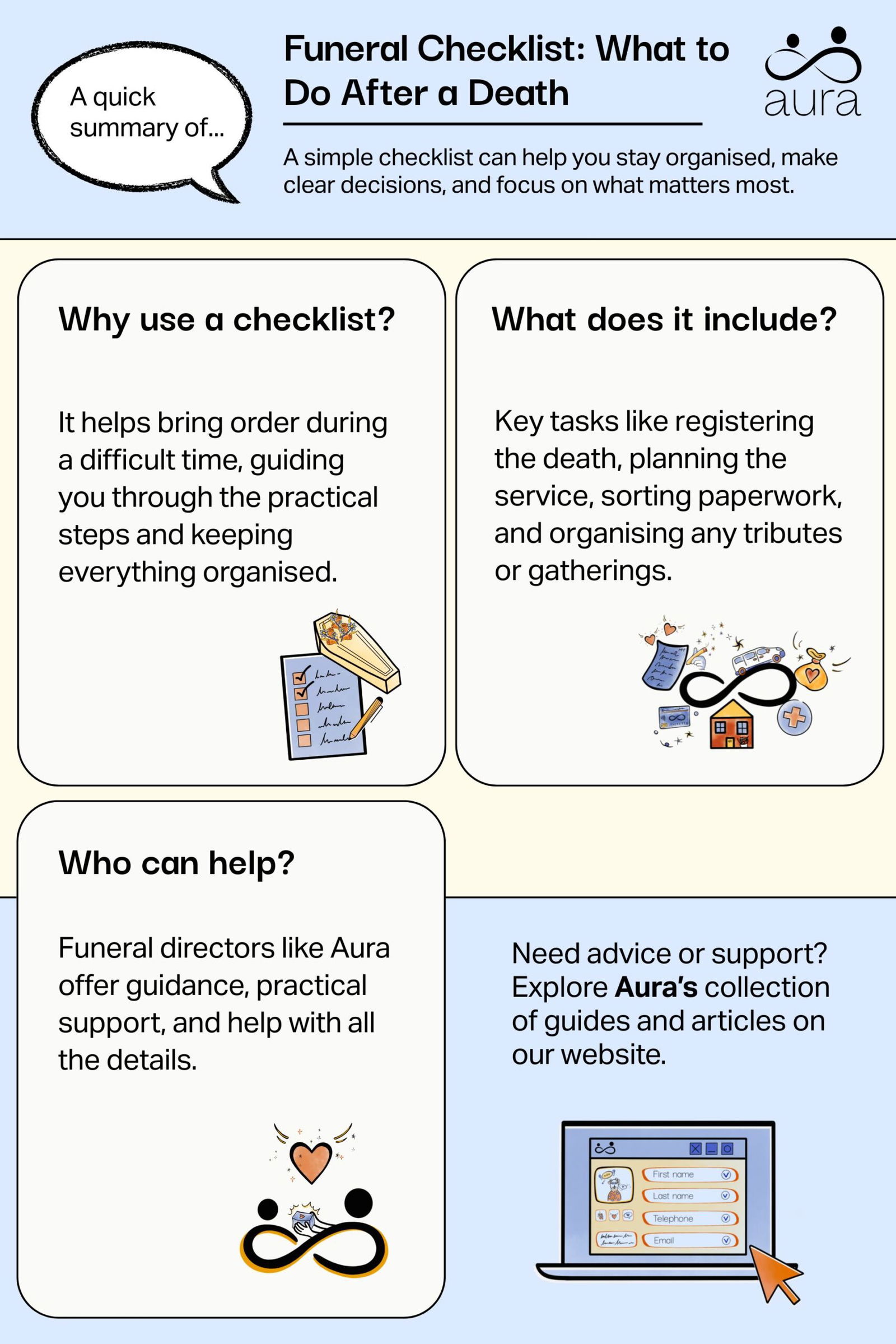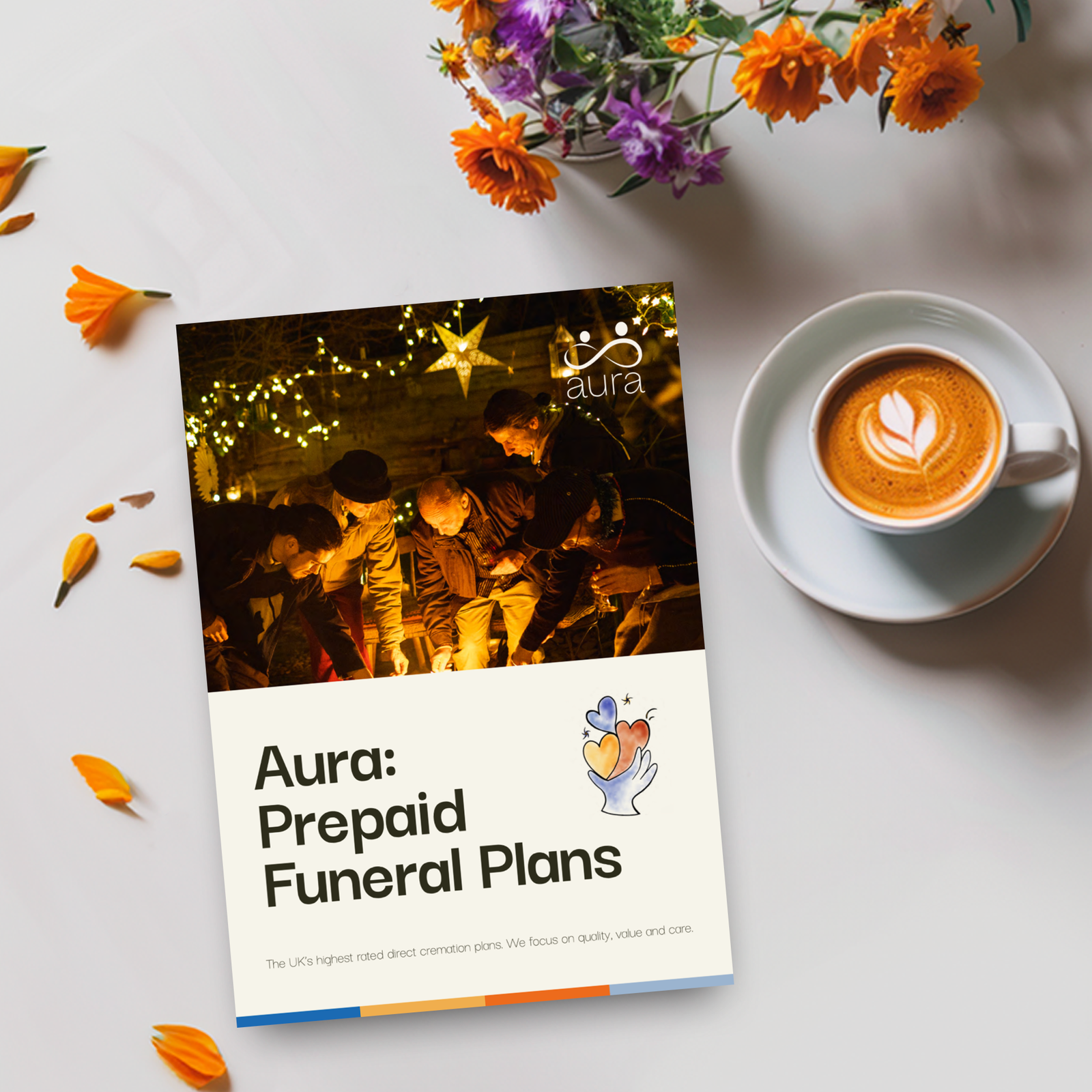





Written by Adam McIlroy.
19 minute read
Making a funeral checklist helps us to gain some control over the bewilderment and confusion that can reign when someone dies and we need to arrange their funeral. It can also bring us peace of mind to make a list of things that we would want in our own funeral plan, or that we’d like to happen to our remains after we die. In this article, we will discuss the concept of a funeral checklist, advising on how to make one, and what sort of things you might want to add to yours.
We’d also just like to say that, if you’ve been brought to this article by some difficult circumstances in your life, whether because you need to understand what to do when someone dies, or because you are trying to figure out your funeral options, Aura is here to help. We are the UK’s top-rated ‘Cremation Services’ provider on Trustpilot, with 4.9/5 stars, offering direct cremation both to those requiring help at short notice, and to those looking to the future with a prepaid funeral plan.
Key takeaways:

A funeral checklist is a step-by-step guide to organising and managing funeral arrangements. You can make one whether you are thinking about your own funeral for the future, or whether you are planning the funeral of a loved one in the here and now.
For those thinking about a funeral plan, the funeral checklist might include research you’ve done about different options, such as if you were to compare Aura funeral plans with other leading providers. Whereas, if you’re currently organising a funeral for someone who has recently died, you may use a funeral checklist to keep track of things like how to get a death certificate, or registering the death.
In both cases, you might also use it to keep track of things like direct cremation prices. All of this information is very useful for helping you or your family to make quicker decisions about funerals, and to streamline communication between you all, which is important when there are a lot of moving parts.
Following a death, there are some things which need to be done immediately, such as notifying the appropriate authorities, informing close friends and family, and arranging for the person who has died to be taken into care as promptly as possible. If you are employed, you may also want to look into what type of leave you take for a funeral.
When someone dies, you will need to register the death promptly: in England and Wales, it needs to be done within five days, and in Scotland, it’s within eight days of the death’s occurrence. You should notify a medical professional immediately. When someone dies in hospital, this should be straightforward, but if it happens anywhere else that doesn’t have a doctor on site, you may need to call emergency services. This is important because the physician attending the person who has died needs to clarify their ‘Cause of Death’.
The cause of death is then verified by a second doctor, known as a ‘Medical Examiner’, who issues a Medical Certificate of Death (MCCD), and sends it to the local Registrar’s office. Once the Registrar receives the MCCD, the bereaved family can make an appointment with the Registrar in order to register the death officially; once this has been done, they will receive the Death Certificate.
Following changes to the death-registration process in September 2024, it’s now far less likely that a death will be referred to the coroner, and therefore, that there will be delays to the registration process. But, in cases where a death was sudden or unexplained, it may still happen, particularly if the Medical Examiner can’t be sure of the cause of death themselves. In a situation like that, the coroner can lead an investigation into matters, but they are able to provide an ‘Interim Death Certificate’ in the meantime, which can prevent administrative delays to the family.
Adding all of the different official bodies you need to notify, and the documents you will need to obtain, to your funeral checklist, can help you to keep everything organised.
Announcing a death to a friend or family member can be incredibly difficult, but it’s also one of the most meaningful and important things we can do at such a time. It’s important, if you can, to inform the people who were closest to the one who has died first, and to make sure you do it in person. As an alternative, in cases where those people may live outside of the country, or may be far away, you could arrange a video call.
We may find talking about death and dying difficult, especially when we ourselves may be feeling raw with our own emotional response to the news. The best strategy is to stick to the facts, try to anticipate follow-up questions from the recipients of the news in advance, and to find the right tone and time. A good death doula can help you and your family to navigate these challenging conversations, and much else, at such a difficult time. You can use your funeral checklist to make a note of who you need to inform, and perhaps an outline of what to say.
Depending on where someone dies, the collection of their body may be an urgent matter. When someone dies in a care home, their own home, or anywhere else without mortuary facilities, they will need to be collected and brought into care as a matter of urgency. However, if they have died in a hospital, or anywhere else which does have its own mortuary facilities, then the family has more time to decide what to do.
If you were to choose Aura as a funeral director, we can bring the person who has died into our care from anywhere in mainland Great Britain. They’ll be taken to one of our local care centres, where they will rest until the day of their cremation. If the person who has died had previously taken out a funeral plan with us, there will be no fee for urgent collection, but a nominal fee will apply in cases where there is no funeral plan in place.
You can use a funeral checklist to decide the type of service that you’d like, either for yourself or for the person who has died; the venue; and the service details.
If you’re thinking ahead, you might be considering a funeral plan, but what is a funeral plan? It’s a way to arrange and pay for your funeral in advance, often including your preferences for the service itself. This can make things simpler and less stressful for your family when the time comes.
There’s a very wide array of different funeral types and themes that you can choose from. Which one you opt for will depend on things like the budget you have available, the religious beliefs on death and funerals that your or the person who has died may have had, and you may need to consider cremation vs burial.
With the decline of religion in the UK, fewer and fewer funerals are actively religious these days, but if the person who has died was religious, then organising their funeral in a church or other religious building might be the best choice. With that said, an Aura direct cremation allows for the practical elements of the funeral to be taken care of, freeing the family up to arrange a proper end-of-life celebration on any theme they like, at a later date.
Use your funeral checklist to take note of the preferences that you think will be important – not just for the funeral itself, but also possibly for cremation ashes ideas and keepsakes for the family. Taking the time to document these choices can also help prevent funeral arrangement disagreements between family members, particularly at a time when emotions are running high and decisions need to be made quickly.
Aura can offer support in personalising a cremation ceremony, from the funeral music that plays when the coffin is brought in and placed upon the catafalque, to the words of the eulogy, and in some cases, even to the theme of the coffin. If you’d like an attended direct cremation ceremony, we can also help you to find a secular celebrant or a religious minister to officiate things. They can work with you or your family to fill the ceremony with the hymns, prayers, anecdotes and poetry that was dear in life to the person who has died.
Your funeral checklist can keep track of all of these personalising details which will help the funeral to be as true as possible to the person who has died.

If you’d like to know more about how to plan a cremation with Aura, our brochure is a helpful place to begin.
Our funeral plans are a helpful way to put everything in place for you or someone else.
When the time comes, our experienced team will be here to guide you through each step, offering support and advice whenever you need it.
To find out more about how our plans work, what’s included, and our story, you can request a brochure by clicking the link below. We will then send you a copy by email or First Class post—whichever you prefer.
One of the main things people find difficult about funerals is managing the many administrative and legal tasks that need to be done. A funeral checklist can help you to organise all the things you may need to access, like the bank accounts of the person who has died, or their over-50s life insurance policy. This could be especially important when attempting to access or process their assets.
The Death Certificate – which the family of the person who has died will receive from the Registrar once they’ve registered the death – is a very important document for legal purposes. Once you or your family has received the main certificate, you (or anyone else) can request a copy of it from the UK government website. This may be necessary should you need to prove the death of your loved one, or should your family need to prove yours, as can be the case when trying to access the bank account or claim from the life insurance policy of someone who has died. In many cases, families use such money and assets to pay for the person’s funeral, so it can be incredibly important.
In general, apart from banks and insurers, a whole range of different institutions may need to be informed of the death. These could include utility companies, any charities they may have been donating to, or any monthly subscription services they may have been using. If possible, you can arrange for mail to be forwarded to a new address, or in general for records to be updated, in order to avoid any future hassle and confusion.
The Death Certificate is also important for the estate of the person who has died, as their assets can’t be administered and discharged without this. The executor of the will needs to apply for probate (the legal right to execute and process someone’s estate). You can use a funeral checklist to record where you have left your own will, or to take note of where your family member has stored theirs. When someone dies without a will, it is still possible to be the executor of their estate, but you will need to apply for something called a “grant of letters of administration” instead. This situation is known as dying intestate and it means the estate is handled according to strict legal rules, rather than any personal wishes.
A funeral checklist can be really useful for keeping on top of funeral logistics. Whether arranging a low-cost funeral, or honouring a loved one with a meaningful celebration of life, you may need to think about transportation and guests; flowers, tributes and keepsakes; and catering or post-service gatherings.
Make a note of any relatives or friends of the person who has died who might need some support in order to attend the funeral, such as those who are elderly or ill. Check to make sure that they have transportation there, and, if not, try to organise something for them. It’s important when you make an announcement publicly about a funeral, that the date, time, and location are clearly visible to the reader. This will allow those who want to come plenty of time to make their own transportation arrangements.
If you are the one in charge of organising a loved one’s funeral, you can make a note of all the RSVPs you’ve received on your funeral checklist, so that you always know exactly how many people will be attending.
Funeral flower etiquette can be nuanced; sometimes people like to have floral tributes to the person who has died, or other such visual displays. Others like to include keepsakes and other personal effects to go into the coffin of the person who has died, as it can bring comfort to those they’ve left behind to know that a piece of them is being buried or cremated with them. Make a list of the things that others would like to include with your loved one, the things you already have, or those things you’d like to be included with you if you are planning your own funeral. Try to also find out, or else record your own, wishes for things like an urn or headstone, especially on such matters as wording and design.
These days, many people are realising that they don’t have to have a funeral in the traditional way; they can arrange a simple, unattended cremation, and then, afterwards, organise a celebration of life that can be themed in any way they wish. People do this in order to more effectively remember a loved one who has passed away. Even those who opt for a typical funeral may still wish to organise a wake afterwards. Use your funeral checklist to keep track of cremation costs, in order to prioritise your spending and make the best use of your budget.

The services of a funeral director, like Aura, can help you to make sense of the many different elements of funeral arranging. They can coordinate services, provide legal and administrative support, and offer emotional and practical guidance.
Funeral directors are there to ease the administrative burden of planning. They know that all of the venue booking and guest inviting that needs to be done at such a difficult time can be overwhelming. They can also help with personalisation, such as music choices.
Aura understands that coping with grief is something we all do differently; some of us like to throw ourselves into the work that needs to be done as a way of distracting ourselves. Others, on the other hand, feel that they need a bit of help to get things done. We are there to work with you, if you’re organising a loved one’s funeral now, or if you’re planning ahead for your own funeral, we will work with your family. We can offer as much or as little support with the coordination as the family feels it needs.
Aura will make sure that all the paperwork, such as the legal cremation forms are coordinated properly, and that it is correct. The efficiency of our service is heavily influenced by the timely and accurate completion of all the documents, so we know how important that is. Whether you need us to liaise with different local authorities or offices, or simply want us to cast an eye over the paperwork that you’ve completed, we are there for you.
When dealing with a recent or impending bereavement, whether coping with the death of a parent, or simply wondering how to say goodbye to a dear friend, death can bring up a lot of complex emotions. These emotions can obviously get in our way when we are trying to deal with lots of complicated admin. A good funeral director will recognise this and be able to offer emotional support where needed.
Aura’s industry-leading team of Aura Angels provide personalised support to every family in our care. The compassionate guidance they offer those families has made us one of the most trusted providers in the country, and the top-rated ‘Cremation Services’ provider on Trustpilot. They will guide you or your family by the hand through the complex emotional time of funeral-planning, lending an ear, and helping whoever they are talking to feel heard and understood.
Once the funeral has been concluded, there are some final things that need to be seen to. Record on your funeral checklist if you would like to thank attendees for coming, gather cremation ashes ideas, or help your loved ones to find grief support, if they need it.
If you’ve noted down a list of the attendees at the funeral, it will be easier to go back and thank them later for having attended. You can do this via email, social media, video call, or even by sending a little thank you card. At funerals, families often collectively pay for things, with individual members contributing in their own way to the cremation costs. Make a note on your funeral checklist of who has paid for the wake, or the flowers, or any other expenses, and try to thank them personally.
It could be a good idea to note down anyone you know who is affected by the death, and who might need extra bereavement support. Write down what bereavement support is available, and signpost family members who are struggling to different services that might work for them.
For instance, the NHS has a program for mental health services, but there are also local death cafes that can be joined; these give people the chance to talk with others who are grieving, but for different people, with many finding the relative anonymity of this experience productive for their own grieving process. Cruse Bereavement Support offers a range of different services and support programs, and they can help you to find what you’re looking for.
Once all of the important matters have been seen to, the funeral has happened, and the estate has been processed, in order to aid the grieving experience you may wish to attend to little, unfinished matters that can get in the way. These could be things like cancelling little subscriptions in order to stop correspondence coming to you or family members in the name of the person who has died. Don’t worry if something slips your mind only to arrive a few months later – it may not be possible to root all of these out ahead of time anyway.
You might also want to make a list of cremation ashes ideas for what happens after the cremation and celebration of life. This could include different keepsakes, such as paperweights, art, or cremation ashes tattoos. Or you could think about ceremonial uses for ashes, such as where and when to scatter them (i.e., significant places or times of year), or even such things as cremation-ashes fireworks, or a tree sapling planted in earth mixed with ashes.
We hope that this article has helped get you started with making a funeral checklist, and helped you to think of a few things that you may need to do. If you currently find yourself planning the funeral of a loved one, or are interested in getting your own funeral plan together, we are here to talk to you. If you have any questions on funeral planning, whether in the long or short term, or about direct cremation in general,we’re here to support as much as is needed.


A funeral checklist is a step-by-step guide to organising and managing funeral arrangements. It helps to bring order to a confusing time, provides peace of mind, and streamlines communication.
Immediate steps include notifying the appropriate authorities, informing close family and friends, and arranging for the person who has died to be taken into care as promptly as possible
Funeral directors like Aura can provide coordination of services, legal and administrative support, and emotional and practical guidance during the funeral planning process